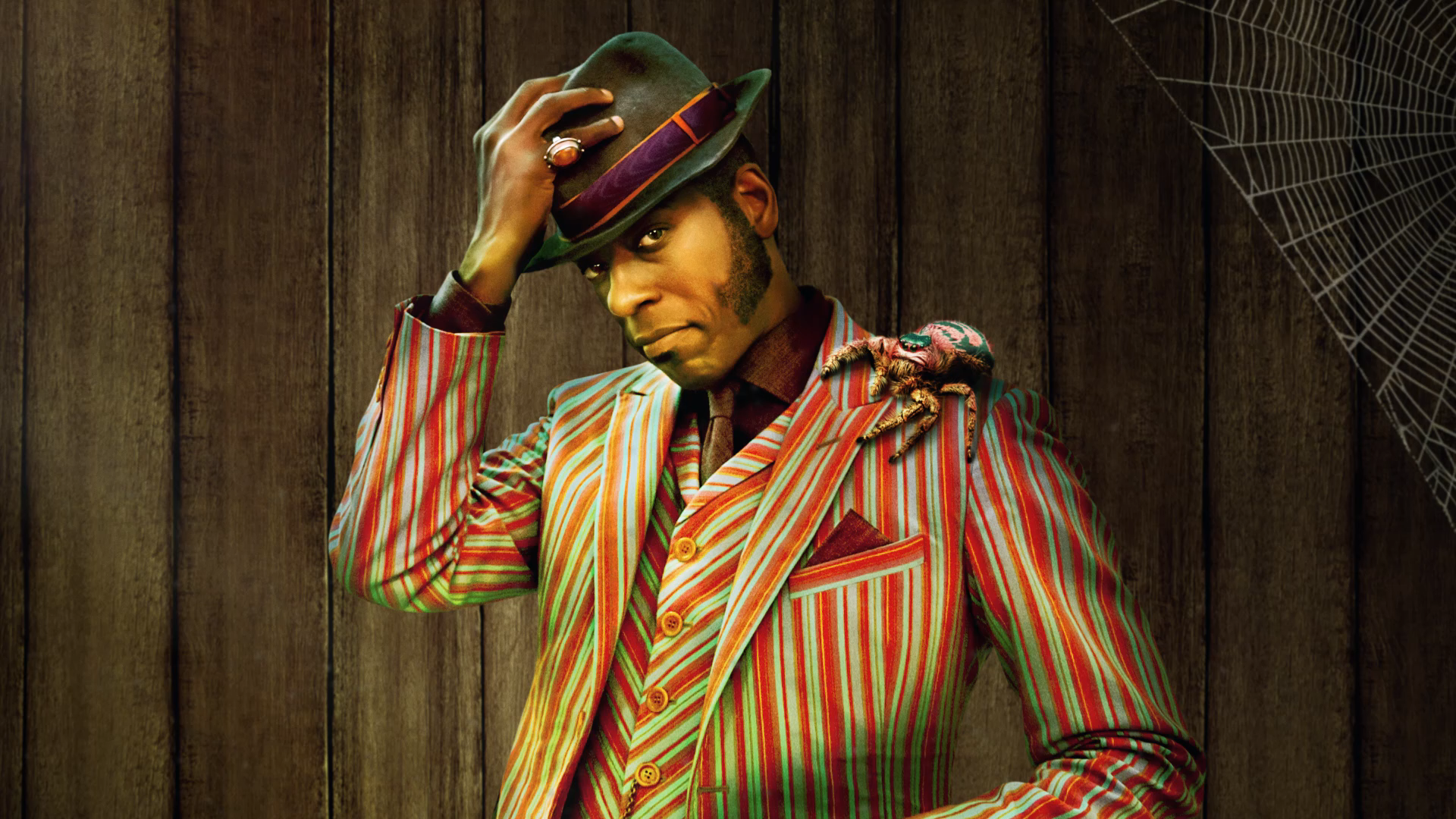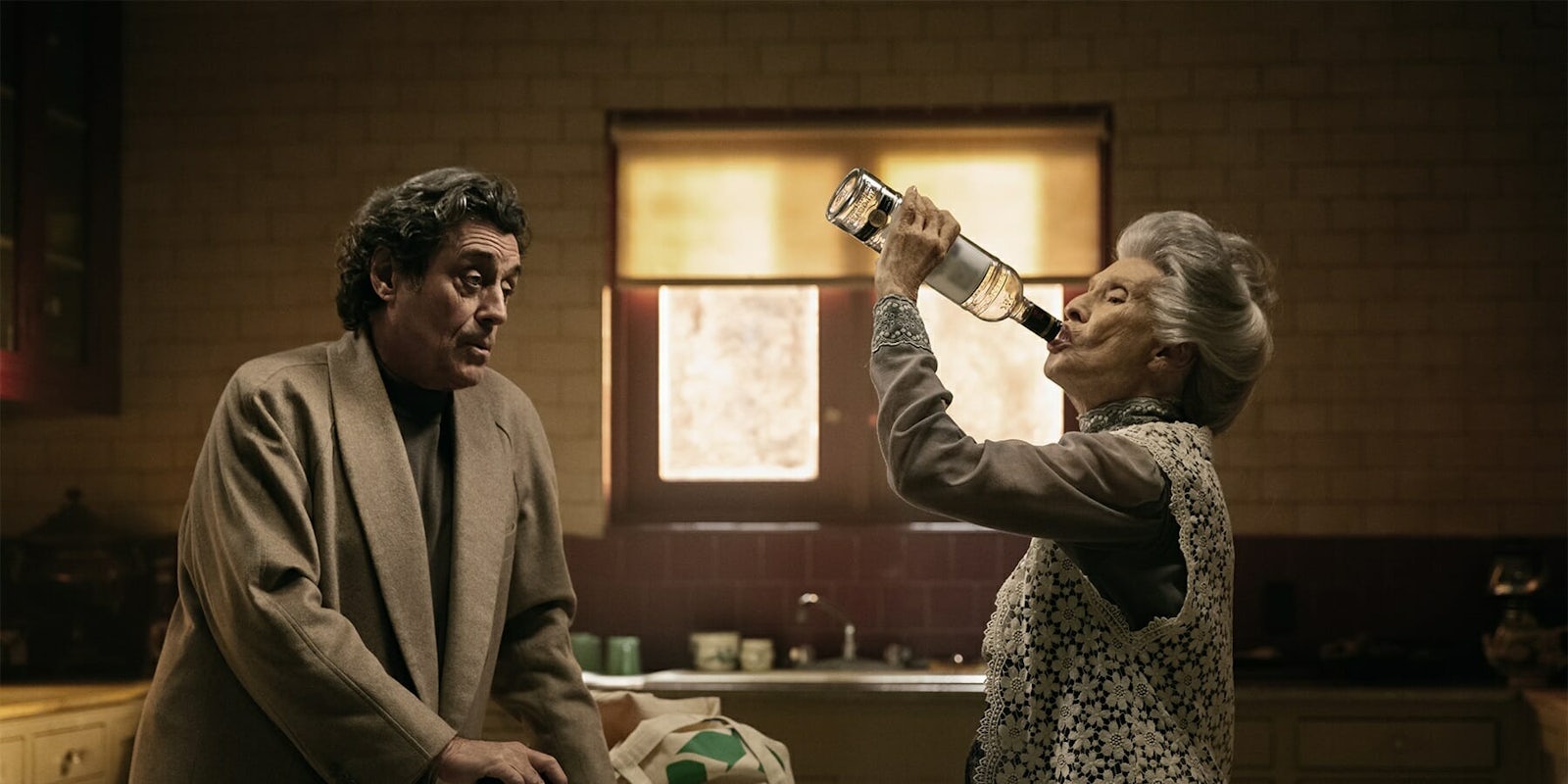Click here for last week’s recap.
Orlando Jones is onscreen for maybe five minutes of this week’s American Gods, but he still steals the show. And on American Gods, there’s a lot of show to steal.
Anansi, the West African trickster god, arrives in America onboard a slave ship. One of his followers summons him for help, and Anansi responds by doing what he does best: telling a story. “Once upon a time, a man got fucked,” he begins. It’s the story of Black life and racism in America, ending on a viciously pragmatic note: “Angry gets shit done.” He encourages the African prisoners to burn the ship with themselves inside, and he floats to America’s shore on the wreckage.
There are about a dozen different levels to that scene, and all of them work incredibly well—unlike the weirdly unexamined use of lynching imagery in episode 1. Orlando Jones’ performance is electrifying, a combination of nightclub emcee (that suit!), fire-and-brimstone preacher, and enraged political speaker. He’s backed by swooping jazz music, completing the surreal time-jump nature of his appearance: a guy in flashy three-piece suit, sharing tales of future history with a ship full of 17th century slaves.
Mr Nancy speaks words as sharp as his clothes. #AmericanGods pic.twitter.com/tMYXukZ0om
— American Gods Intl (@AmGodsIntl) May 3, 2017
Mr. Nancy’s speech is sharp and angry and political—and it says a lot about his attitude as a god. He understands the racism and injustice at the heart of American history, but he doesn’t offer a benevolent solution. The men and women on that ship are his blood sacrifice, like Odin’s vikings in episode 1. It’s a classic trickster move, manipulating truth and emotion through clever words, to a conclusion that feels narratively satisfying, but is casually cruel and mostly beneficial to the trickster himself.
That scene solidifies American Gods’ relationship with storytelling and oral history. These deities survive because their stories survive, and we hear them one by one as Shadow and Mr. Wednesday make their way across America. A classic roadtrip story, populated by characters who love to talk about themselves.
The middle section of this episode is a little slow (episode 3 is where things really kick off, in my opinion), partly because we spend so much time with Shadow. He has to put his wife’s affairs in order, a necessary but rather unengaging subplot after the electric shock of Anansi. Fortunately, director David Slade was in charge again this week.
Slade (whose Twitter bio accurately reads, “I design and direct hallucinations for others”) has an extraordinary visual imagination. His background is perfect for the atmospheric weirdness of American Gods: a career of horror filmmaking (Hannibal, 30 Days of Night) and music videos. In his hands, momentary afterthoughts turn to magic. This week’s highlight was Zorya Vechernyaya (Cloris Leachman) unlocking her front door, a banal action that Slade investigates with surgical precision, flying inside the lock as the tumblers click into place.
Zorya Vechernyaya is one of three Russian sisters sharing an apartment in Chicago, living with with an aging slaughterhouse employee named Czernobog (Peter Stormare). All four are Slavic deities, and they’re the first stop on Mr. Wednesday’s quest. He wants to recruit Czernobog to fight the modern gods like Media (Gillian Anderson), who appeared this week as Lucille Ball, speaking seductively to Shadow from inside a mall TV.
The Zorya sisters’ dinner party was a straightforward moment in the book, but it gains a lot when translated to the screen. This kind of off-kilter social interaction is where Bryan Fuller’s dark sense of humor comes into play.
There’s a cringeworthy comedy to Czernobog’s aggressively uncomfortable comments, instantly familiar if you’ve ever had dinner with an elderly racist relative. Meanwhile, Ian McShane pulls charm from thin air whenever he’s onscreen. His sagging face and sly eyes are perfect for the mocking worldliness of Odin, and there’s a tremendous amount of detail to his performance. There’s a moment in this episode where he stirs his coffee in such a catty and meaningful way, I skipped back so I could rewatch it. Not to mention his flirtation with Vechernyaya, where Wednesday sleazily tries to melt her purse-mouthed curmudgeonliness. (Cloris Leachman turned 90 while filming the show, and long may she reign.)
We end on a cliffhanger, with Shadow gambling his life on a game of checkers with Czernobog. He’s obviously going to survive, so the real turning point is Shadow accepting his role in a mythic universe. He’s still a regular guy, but he’s starting the learn the rules of his new life. It’s a world where people are expected to make life-altering decisions over a game of checkers, and where fortune-telling and destiny are treated as undeniable fact.
In the same way that Anansi foretells the brutal future of Black life in America, the show repeatedly foreshadows death and doom for Shadow.
American Gods mythology corner
Anansi takes a while to show up in the book, and the show was right to introduce him earlier. He’s a superstar whose stories spread across the African diaspora, evolving over the decades with occasional forays into pop culture. Gaiman himself wrote an entire book about Mr. Nancy (or what it’s like to have a man like Mr. Nancy as your father), titled Anansi Boys.

Tricksters are a traditional stock character in many cultures, for reasons that may not be immediately obvious. It makes sense to have gods for war, fertility, and death, but why are there so many characters like Loki, Anansi, and the Chinese monkey Sun Wukong? The simple answer is that they’re fun. The more complicated answer is they represent a relatable bridge between gods and humans; a character who survives on his wits and humiliates people in power. People enjoy trickster stories for the same reason they love Joanne the Scammer.
Gaiman understands why tricksters are so satisfying—and why Anansi was the right choice for an American story. He’s cynical yet entertaining, overlapping with Br’er Rabbit as an antihero who drifts from West African mythology into African-American folklore. The show added the slave ship scene to highlight that connection, showing how Anansi uses wit and wordplay to kill the white slave-owners while ultimately looking out for himself. He acknowledges the harsh realities of racism in America, but he isn’t telling a wholesome morality tale; he’s talking about getting even.
Unlike Anansi, whose stories remain popular today, Czernobog is our first example of a “forgotten” deity. He represents the idea at the heart of American Gods, that mythical figures shrivel and die without belief. Czernobog and the Zorya sisters (whom I’ll discuss next week) originate in Slavic mythology, with Czernobog as a dark, dangerous god—essentially the bogeyman counterpart to his brother Bilabog, the “light” god. But beyond that, we don’t know much.
In an interview with Rain Taxi when American Gods was first published, Gaiman talked about the difficulty of researching Czernobog’s background.
“At the end of three weeks of solid research I had nothing I hadn’t had in some little Peterson’s book of gods at the start. There’s so little known about the Russian Gods. The Catholic church and the Russian Orthodox church stamped out most of it, and then Napoleon burned the rest of it on his way to and from Moscow.”
So while Mr. Nancy and Mr. Wednesday arguably came to the U.S. in positions of power, on the backs of their worshippers, Czernobog and the Zorya sisters may have arrived in New York as refugees. Either that, or they arrived with refugees who wanted to escape political upheaval in Russia, and gradually forgot their folklore. Czernobog defines himself by his strength and fearsomeness, but as we learn this week (and moreso in next week’s episode), he’s an old man who no longer feels capable of riding into battle.


